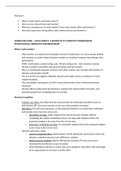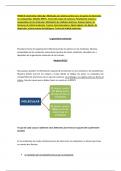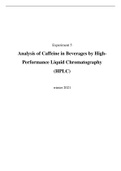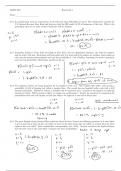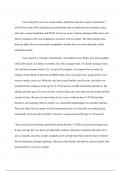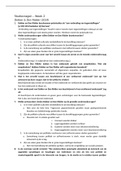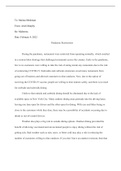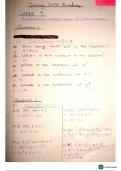Problem 4
What’s math anxiety and what causes it?
How can you reduce/treat math anxiety?
What are consequences of math anxiety? Does math anxiety affect performance?
How does expressive writing affect math anxiety and test performance?
SUAREZ-PELLICIONI – MATH ANXIETY: A REVIEW OF ITS COGNITIVE CONSEQUENCES,
PSYCHOLOGICAL CORRELATES AND BRAIN BASES
What’s math anxiety?
- Math anxiety: an irrational and impeditive dread of mathematics, for some people dealing
with numbers or math-related situations evokes an emotional response that disrupts their
performance
- MARS: mathematics anxiety rating scale, 98-item rating scale – led to shorter versions
- MA has a positive correlation with general anxiety and test anxiety
- MA is a conceptually separate construct from other anxiety, also overlaps with phobia, it’s
stimulus and situation specific
- The sum of MA and negative attitudes toward math might result in avoidance of math-
related situations
- The unavoidable consequence of MA is worse performance when math achievements
measured
- MA also effects professional development, employment opportunities and salary, and
prevents people from computing prices accurately
Numerical cognition
- Problem size effect: the effect that the characteristics of arithmetical problems have on
performance (RT and errors increase as the size of the problem increases)
- Split effect: RTs and error decreases, as the proposed solution in an arithmetic verification
task deviate more from the correct one
o plausibility strategy: easily ruling out the clearly incorrect solution without
completing the regular calculation process, for large-split solutions (when the
proposed solution is far away from the correct one)
o exhaustive verification strategy: for small-split solution (when the proposed solution
is very close to the correct one)
- Ashcraft and Faust’s study:
o anxiety-complexity effect: deterioration in HMA individuals’ performance when the
stimulus conditions become more difficult or complex
o Speed-accuracy tradeoff: highest HMA group had faster RTs but more errors
meaning they sacrificed accuracy for speed
o HMA individuals took time to reject false carry problems, they didn’t take advantage
of the opportunity to use short-cuts like LMAs
, o Global avoidance effect: e.g. enrolling in fewer math classes, selecting majors
involving less math content
o Local avoidance effect: desire to complete the task as soon as possible
This is responsible for speed-accuracy effect
o Flawed scores: combination of errors and extreme RTs, shows the participants
difficulties in processing, HMA people show more flawed scores as the level of split
increases (opposite to LMA people)
Explanations of MA
MA as task-related competition for WM resources
- Processing efficiency theory (PET):
o The anxiety reaction involves worrying intrusive thoughts that consume the limited
attentional resources of the central executive of WM so there’s less available for
current processing
o MA would only affect performance if the task depended on substantial WM
processing – for complex arithmetic
o Higher levels of MA are related to lower available WM capacity
but this is not a stable characteristic rather a temporary reduction in
processing capacity when anxiety is aroused
MA as a deficit in low-level numerical representation
- complex-math deficit observed in HMA individuals might arise due to deficit in low-level
numerical processing skills
- 2 tasks in this:
o Subitizing: elements have to be enumerated, fast and accurate HMA and LMA
don’t differ
o Counting: 5 or more elements are presented, makes a greater demand HMA
performed significantly worse
- Argues against anxiety-complexity effect because math-anxious people differed in a task as
simple as enumerating the quantity of stimuli
- There’s evidence for this theory & against the complexity hypothesis, but they found
evidence for complexity theory as well they decided on a hybrid theory:
o HMA might suffer from low-level numerical deficits that form the basis of their
difficulties, these difficulties cause WM-demanding ruminations which makes the
initial difficulties worse
- Numerical Size effect: HMA need more time to respond to large numbers than small ones
- Numerical Distance effect: HMA need more time to respond to numbers that are close (8 &
9) than the ones separated (2 & 9)
o psychophysiological evidence for a less precise representation of numerical
magnitude in HMA people
What’s math anxiety and what causes it?
How can you reduce/treat math anxiety?
What are consequences of math anxiety? Does math anxiety affect performance?
How does expressive writing affect math anxiety and test performance?
SUAREZ-PELLICIONI – MATH ANXIETY: A REVIEW OF ITS COGNITIVE CONSEQUENCES,
PSYCHOLOGICAL CORRELATES AND BRAIN BASES
What’s math anxiety?
- Math anxiety: an irrational and impeditive dread of mathematics, for some people dealing
with numbers or math-related situations evokes an emotional response that disrupts their
performance
- MARS: mathematics anxiety rating scale, 98-item rating scale – led to shorter versions
- MA has a positive correlation with general anxiety and test anxiety
- MA is a conceptually separate construct from other anxiety, also overlaps with phobia, it’s
stimulus and situation specific
- The sum of MA and negative attitudes toward math might result in avoidance of math-
related situations
- The unavoidable consequence of MA is worse performance when math achievements
measured
- MA also effects professional development, employment opportunities and salary, and
prevents people from computing prices accurately
Numerical cognition
- Problem size effect: the effect that the characteristics of arithmetical problems have on
performance (RT and errors increase as the size of the problem increases)
- Split effect: RTs and error decreases, as the proposed solution in an arithmetic verification
task deviate more from the correct one
o plausibility strategy: easily ruling out the clearly incorrect solution without
completing the regular calculation process, for large-split solutions (when the
proposed solution is far away from the correct one)
o exhaustive verification strategy: for small-split solution (when the proposed solution
is very close to the correct one)
- Ashcraft and Faust’s study:
o anxiety-complexity effect: deterioration in HMA individuals’ performance when the
stimulus conditions become more difficult or complex
o Speed-accuracy tradeoff: highest HMA group had faster RTs but more errors
meaning they sacrificed accuracy for speed
o HMA individuals took time to reject false carry problems, they didn’t take advantage
of the opportunity to use short-cuts like LMAs
, o Global avoidance effect: e.g. enrolling in fewer math classes, selecting majors
involving less math content
o Local avoidance effect: desire to complete the task as soon as possible
This is responsible for speed-accuracy effect
o Flawed scores: combination of errors and extreme RTs, shows the participants
difficulties in processing, HMA people show more flawed scores as the level of split
increases (opposite to LMA people)
Explanations of MA
MA as task-related competition for WM resources
- Processing efficiency theory (PET):
o The anxiety reaction involves worrying intrusive thoughts that consume the limited
attentional resources of the central executive of WM so there’s less available for
current processing
o MA would only affect performance if the task depended on substantial WM
processing – for complex arithmetic
o Higher levels of MA are related to lower available WM capacity
but this is not a stable characteristic rather a temporary reduction in
processing capacity when anxiety is aroused
MA as a deficit in low-level numerical representation
- complex-math deficit observed in HMA individuals might arise due to deficit in low-level
numerical processing skills
- 2 tasks in this:
o Subitizing: elements have to be enumerated, fast and accurate HMA and LMA
don’t differ
o Counting: 5 or more elements are presented, makes a greater demand HMA
performed significantly worse
- Argues against anxiety-complexity effect because math-anxious people differed in a task as
simple as enumerating the quantity of stimuli
- There’s evidence for this theory & against the complexity hypothesis, but they found
evidence for complexity theory as well they decided on a hybrid theory:
o HMA might suffer from low-level numerical deficits that form the basis of their
difficulties, these difficulties cause WM-demanding ruminations which makes the
initial difficulties worse
- Numerical Size effect: HMA need more time to respond to large numbers than small ones
- Numerical Distance effect: HMA need more time to respond to numbers that are close (8 &
9) than the ones separated (2 & 9)
o psychophysiological evidence for a less precise representation of numerical
magnitude in HMA people

